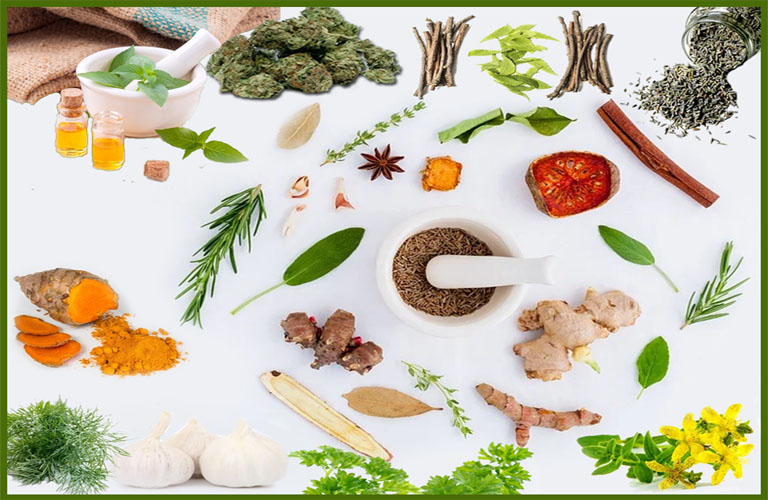Herbs
Herbs have always been an important tool in the hands of ancient healers and many cultures today still use herbs as their primary source of medicine. Ancient civilizations relied on healing power of herbal medicines for a wide variety of ailments.
According to World Health Organization (WHO) herbal medicines include herbs, herbal materials, herbal preparations and finished herbal products, that contain as active ingredients parts of plants, or other plant materials, or combinations.
Herbal remedies made by reputable manufacturers, taken according to the directions and in the recommended dosages, are relatively safe to consume. When shopping for herbal remedy, look for a company that sells its products at a variety of locations, has an extensive product line, stands behind its products and is recommended by your health care professional or pharmacist. In many cases herbal products are effective and work well, and there is some scientific evidence to back up their effectiveness. Keep in mind that herbal remedies are not "miracle cures" or "quick-fix", they usually need longer time to treat the problems. Most health problems don't start overnight, so they cannot be cleared overnight either. Some claims regarding herbal products have been exaggerated. The old wisdom still applies: if it sounds too good to be true, it probably is.
A WORD OF CAUTION: Herbal products contain a variety of individual substances, most of which occur naturally in the herb, so keep in mind that some of these substances may interact with prescription drugs and over the counter medications. Also, some herbal remedies are not recommended for people with certain medical conditions. Ask your health care professional or pharmacist about possible interactions between herbal products and other medications you are using.
NOTE: Avoid diagnosing and treating yourself in place of seeking proper health advice from a competent health professional. It is advisable to seek the advice from your health care professional concerning any ailment, treatment of diseases, or when starting a supplement program.
Check the links below to find more information:

Did you Know?
North Americans today make more visits to nontraditional physicians, including naturopaths who claim expertise in herbs and other natural therapies, than to their family doctors. They spend almost as much out of pocket (not reimbursed by health insurance) on alternative medicine as on all unreimbursed physician services.
A great number of people admitted to taking more than the recommended doses of over-the-counter medications. The chances of a problem with over-the-counter treatments increases if the medicine is taken more frequently or in higher doses than recommended.
Many people never get to the fine print about the potential dangers of over-the-counter medicines because they are to busy deciding and finding which item will best treat their particular problem.
U.S. doctors more commonly priscribed medicinal herbs before World War II than today.
An estimated 25% of all modern pharmaceutical drugs are derived from herbs, including aspirin (from white willow bark); the heart medication digitalis (foxglove); the cancer treatment Taxol (Pacific yew tree); birth-control pill (from Mexican yam).
Before taking any new medications, including natural health products, speak to your health care provider
or pharmacist. Tell your health care provider about any natural health products you may be taking.
Avoid Negative Interactions
There may be negative interactions associated with some dietary supplements and other medicines you are taking. Consult a health care provider before using any dietary supplement.
Talk with a health care provider before using a dietary supplement. This is a good idea, especially for certain population groups. If you are pregnant, nursing a baby, or have a chronic medical condition such as diabetes or heart disease, be sure to consult your health care provider or pharmacist before purchasing or taking any supplement.
Inform your health care provider about all the supplements you use, especially before surgery. Some supplements can have unwanted effects during surgery. You may be asked to stop taking these products at least 2-3 weeks ahead of the procedure to avoid potentially dangerous interactions. These interactions could cause changes in heart rate or blood pressure, increased bleeding, or other problems that could adversely affect the outcome of your surgery.
Know that some supplements may interact with prescription and over-the-counter medicines. Taking a combination of supplements or using these products together with medications (whether prescription or OTC drugs) could produce adverse effects, some of which could be life-threatening.
For example: Coumadin (a prescription medicine), ginkgo biloba (an herbal supplement), aspirin (an OTC drug), and vitamin E (a vitamin supplement) can each thin the blood, and taking any of these products together can increase the potential for internal bleeding.
Ensuring quality - Many countries have regulations to provide more accountability in the manufacturing process and manufacturers are usually required to evaluate the identity, purity, quality, strength, and composition of dietary supplements, but it is very important to do your research and make sure you have confidence in the quality of the dietary supplement products that you purchase.





